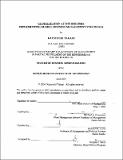Globalization at NTT DoCoMo : implementing global business management strategies
Author(s)
Takagi, Katsuyuki, 1964-
DownloadFull printable version (5.916Mb)
Other Contributors
Sloan School of Management.
Advisor
Michael A. Cusumano.
Terms of use
Metadata
Show full item recordAbstract
Global business management has become one of the most important issues facing companies today, and global economic dynamics provide companies with both tremendous opportunities and formidable challenges. Countries are increasingly tied to each other through deregulation and liberalization for economic exchanges. Global competition is a necessity rather than a matter of direction for many companies. Global business management is more complex than doing business in a single country because of differences in source and nature between the home country and a target country. There are more managerial items that require modification with the passage of time. To be a successful multinational corporation, companies must recognize the whole picture of global business management and pursue best practices continuously. NTT DoCoMo, the largest Japanese mobile network operator, has achieved great success in the domestic market by leveraging its technological superiority since it was established in 1992. As the signs of market saturation began to emerge in Japan, NTT DoCoMo advanced its plans for globalization aggressively. For NTT DoCoMo, which does not own real products and production facilities, this represents a new challenge a Japanese company, namely, that NTT DoCoMo needs to enhance its global management system more than other Japanese manufacturing MNCs. This thesis introduces the key elements and appropriate procedures for decision making in global business from top management's point of view. These elements and procedures are represented in the "2C + 5P Model," which is composed of two fundamental elements and five managerial essentials. I briefly review the history of globalization by Japanese MNCs, and identify the composition (cont.) of their success factors based on interviews with managers from successful Japanese MNCs. Using the 2C + 5P Model, I analyzed global business management at NTT DoCoMo. And finally I conclude by identifying the keys to success for Japanese MNCs in general, with specific recommendations for globalization at NTT DoCoMo.
Description
Thesis (M.B.A.)--Massachusetts Institute of Technology, Sloan School of Management, 2004. Includes bibliographical references (leaves 134-135).
Date issued
2004Department
Sloan School of ManagementPublisher
Massachusetts Institute of Technology
Keywords
Sloan School of Management.